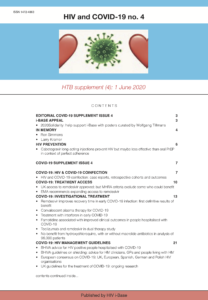HIV and COVID-19: issue 4 (1 June 2020)
1 June 2020. Related: Editorial.
 Contents online
Contents online- Download PDF – 1 column
- Subscribe to HTB by email
This is the fourth HTB that is produced as as a supplement on COVID-19.
Some HIV articles are still included though, including to remember leading US activists Ron Simmons and Larry Kramer who both died this week. We also have positive early results for using long-acting cabotegravir injections as HIV PrEP. Plus updates on HIV conferences, many of which have changed to virtual meetings.
But the rest of the contents are based on COVID-19 – because this is the most important health information for people living with HIV right now. And there has been a lot to cover, even in the few weeks since the last issue.
We lead with a review of current studies on HIV and COVID-19 coinfection, five of which – from the UK, Spain, the US, Italy and Germany – were published in the last two weeks. Although most support BHIVA and EACS statements of little additional risk from HIV in people on effective ART, most of these studies are small. And some – including the new case series from Kings College Hospital in South London – report higher rates of mortality and are more cautious.
We also include articles on many of the investigational treatments for COVID-19, including remdesivir, convalescent plasma, interferon, famotidine, tocilizumab and hydroxychloroquine (HCQ).
Results from the randomised, placebo-controlled ACTT study provide the most convincing evidence of benefit to date – and supports the earlier decision for FDA approval. The UK MHRA have responded by launching an early access programme across the country. In reporting the entry criteria we also comment that some important groups might be overlooked – and these guidelines are reconsidered.
And now that remdesivir is now available in the the UK, ongoing COVID-19 studies should add it to current standard of care in many ongoing COVID-19 studies, and potentially for all participants.
Undating research as the standard of care changes was always a community principle in HIV research – so that no participants receive less than the standard of care. Although this will improve care for participants, not doing this would jeopardise further enrolment and retainment.
For example, in the randomised UK DISCOVERY trial. Although more than 10,600 participants are so far enrolled DISCOVERY hasn’t reported preliminary results yet, or included a data review timeline in the protocol. Other researchers have published negative results for some of the compounds being used, such as monotherapy with lopinavir/r or HCQ. This includes a large HCQ meta-analysis published in the Lancet (We also report this study in detail).
Although the DISCOVERY study plans to continue its HCQ arm, the international WHO SOLIDARITY study (with a European branch called RECOVERY) has suspended the HCQ arm for further review.
DSMBs for large studies should be looking at prompt discontinuation of study arms with no active benefit. Similar consideration should now be made to change single therapy arms to ones that include remdesivir as a basis for dual therapy,
In noting the lack of UK treatment guidelines for COVID-19, we review the NIHR listing for the 42 key research studies.
And we include reports on COVID-19 pathogenesis thanks to Mark Mascolini’s reports on NATAP, a US community organisation that has been providing access to medical information on HIV and hepatitis for well over two decades.
Finally, we are hearing anecdotal reports of dramatically reduced cases of newly diagnosed COVID-19 in several London hospitals. This is hopefully being repeated through the rest of the UK.
We join our readers in the hope that this will be sustained, and the chance that the relaxing of at least some of the physical distancing measures will not lead to a second wave of COVID-19. Even managing smaller outbreaks though is ultimately dependent on having effective treatment and hopefully a future vaccine.

